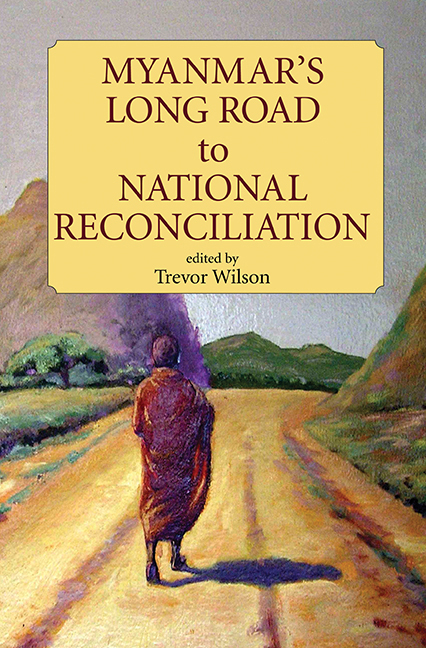Book contents
- Frontmatter
- Contents
- Acknowledgements
- The Contributors
- Glossary
- Overview
- I Perspectives on Recent Political Developments
- II Perspectives on the Economy and on Agricultural Development
- III Perspectives on National Reconciliation and Civil Society Development
- 8 Civil Society and Legitimacy: The Basis for National Reconciliation in Burma/Myanmar
- 9 Making a Responsible Corporate Contribution to Modern Diplomacy in Myanmar
- 10 Creating an Environment for Participation: International NGOs and the Growth of Civil Society in Burma/Myanmar
- 11 More Than Saving Lives: The Role of International Development Agencies in Supporting Change Processes in Burma/Myanmar
- 12 Exit, Voice and Loyalty in Burma: The Role of Overseas Burmese in Democratising Their Homeland
- IV Charting the Way Ahead
- Index
8 - Civil Society and Legitimacy: The Basis for National Reconciliation in Burma/Myanmar
from III - Perspectives on National Reconciliation and Civil Society Development
Published online by Cambridge University Press: 21 October 2015
- Frontmatter
- Contents
- Acknowledgements
- The Contributors
- Glossary
- Overview
- I Perspectives on Recent Political Developments
- II Perspectives on the Economy and on Agricultural Development
- III Perspectives on National Reconciliation and Civil Society Development
- 8 Civil Society and Legitimacy: The Basis for National Reconciliation in Burma/Myanmar
- 9 Making a Responsible Corporate Contribution to Modern Diplomacy in Myanmar
- 10 Creating an Environment for Participation: International NGOs and the Growth of Civil Society in Burma/Myanmar
- 11 More Than Saving Lives: The Role of International Development Agencies in Supporting Change Processes in Burma/Myanmar
- 12 Exit, Voice and Loyalty in Burma: The Role of Overseas Burmese in Democratising Their Homeland
- IV Charting the Way Ahead
- Index
Summary
Introduction
The concept of civil society is now an internationally fashionable topic of academic discourse. Its original popularity in Western intellectual circles, where civil society is considered as a requisite for a democratic society, has been enhanced as this theme has been picked up in non-Western states: theorists from many countries reexamine their histories to determine whether civil society had historic roots in their own cultures and, if so, in what forms it may have existed. Thinking about civil society is thus a growth industry. Although both the term itself and the institutions that we call civil society have profoundly important and positive connotations in many societies, especially in the West, this is not universally true. In some states the concept is not generally known. In China, for example, “civil society” has been considered in official circles a pejorative term, one that implies anti-state activities and threats to the monopoly of political power held by the Chinese Communist Party. It has thus often been considered anathema by the regime.
Why specifically might one be interested in civil society, however defined, and why in Myanmar? The social science literature is replete with illustrations of its importance, at least in the American context, and now more broadly. De Tocqueville, writing over one hundred and fifty years ago, pointed out that the interest and phenomenon of private Americans coming together to pursue some common purpose at the local level were singular enough to warrant comment, as this was rare in the Europe of his time. More modern literature stresses four aspects of civil society that have substantial impact on governance.
The first is that when people group together to resolve problems or promote common interests, a degree of limited trust, also called social capital, is created that is related to the purposes of the group — that is, to goals characteristic of and generated by such association.
- Type
- Chapter
- Information
- Myanmar's Long Road to National Reconciliation , pp. 149 - 176Publisher: ISEAS–Yusof Ishak InstitutePrint publication year: 2006



